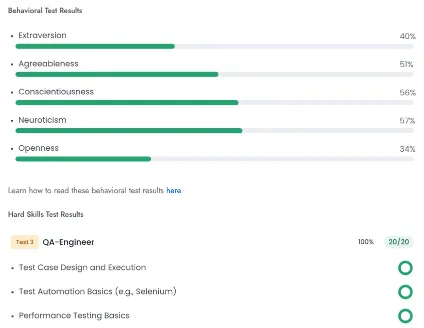What is Skill-first Approach in Recruitment
In the dynamic landscape of modern business, traditional recruitment methods no longer suffice. Employers are shifting their focus from surface-level credentials and titles to a more nuanced and effective approach – in the past years we have seen the raise of the so called skill-first recruitment. This approach emphasizes the importance of unbiased assessment, the value of demonstrable skills over job titles and academic accolades, and the comprehensive evaluation of hard skills, behavioral competencies, and language/communication abilities. In this article, we explore the myriad advantages of skill-based recruitment for employers.
According to a Deloitte study on future jobs and the skills-first approach, we can use the term “skills” to refer to both technical skills (hard skills) such as programming, data analysis or accounting, and soft or “human” skills such as critical thinking and emotional intelligence. We then also include in this definition the so-called potential (a word by which we can mean a set of skills, latent qualities and collateral competencies of an individual that could be developed in the future and lead to good performance in everyday work).
The OnlyTopTalent platform embraces the skill-first recruitment approach and champions it; through the candidate vetting and testing system, we foreground and certify the skills of talent. If you are a candidate and want to become a Top Talent you can apply here. If you are a company or a recruiter and want to know more about our skill-first platform watch the video in this page video.
But let’s get into the details of the skill first recruitment approach and its benefits for both employers and candidates.
1. Unbiased Assessment
One of the standout benefits of skill-first recruitment is its inherent ability to eliminate bias from the hiring process. Traditional approaches often favor candidates with prestigious alma maters or a list of impressive job titles, inadvertently sidelining potentially outstanding talent. By evaluating candidates based on their actual skills and competencies, employers ensure a more equitable and inclusive recruitment process. This not only promotes diversity but also opens doors to individuals who might have been overlooked in the past, enhancing the talent pool and the overall workplace dynamic.
2. Demonstrable Skills Over Credentials
In a world where degrees and certifications can only provide a partial picture of a candidate’s abilities, skill-based recruitment puts the spotlight on what truly matters – demonstrable skills. Employers gain a more accurate understanding of a candidate’s capabilities, allowing them to identify the right fit for the organization. This approach shifts the focus from “what you have on paper” to “what you can actually do.” As a result, employers can make more informed hiring decisions and bring in candidates who are not just academically qualified but also practically adept.
A great tool to find candidates with specific skills is ContactOut, you can use their filters to find candidates that fit your needs.
3. Comprehensive Assessment
Skill-based recruitment goes beyond the one-dimensional evaluation of candidates; it encompasses a multifaceted approach to assess their suitability for a role. Employers must consider three key dimensions:
Hard Skills: These are the technical, industry-specific skills that are essential for the role. Testing a candidate’s proficiency in these skills ensures they can perform the core functions of the job effectively.
Behavioral Skills: Soft skills, such as communication, teamwork, adaptability, and problem-solving, play a pivotal role in an employee’s success within an organization. Evaluating these skills allows employers to gauge how well a candidate will integrate into the company’s culture and work with existing teams.
Language Skills: In a globalized world, effective communication is key. Assessing a candidate’s language skills, especially if the role involves interactions with international clients or partners, is critical. Fluency in multiple languages can be a game-changer for certain positions.
4. Candidates Should Embrace Skills-first approach
In this era of skill-first recruitment, it’s crucial for candidates to recognize the advantages that this approach offers to both sides of the hiring equation. Rather than being concerned about their skills being rigorously tested, candidates should view it as an opportunity to showcase their true potential. Skill-based recruitment is not just about what candidates can do for a company; it’s equally about what the company can offer in return. It’s a two-way street where employers aim to find the perfect match for their organization, a candidate who can thrive, innovate, and drive success.
By embracing this approach, candidates position themselves to find roles that truly resonate with their talents and aspirations. It aligns their skills with the right opportunities, leading to job satisfaction, career growth, and personal fulfillment. Skill-based recruitment is a beacon of fairness and equal opportunity, ensuring that the talent pool is tapped into efficiently, and individuals are placed where they can express their full potential. Candidates should feel empowered to present their skills confidently, knowing that they are on the path to discovering a role that not only values their abilities but also nurtures their professional growth. In essence, skill-first recruitment is a pathway to a brighter, more satisfying future for both candidates and employers, where the perfect match becomes a reality.
Variation in languages
At OnlyTopTalent we have recently launched a new section to practice and familiarize with different type of skills tests, including English language and over 20 different technical skills assessments. Try the different tests and when you feel ready, apply to become a Top Talent (we have also prepared some resources for you to take the assessments stress-free and well prepared, with 5 useful tips that you can read here).
Conclusions
Skill-first based recruitment is not merely a trend; it’s a transformative approach that empowers employers to build stronger, more diverse teams. By emphasizing unbiased assessment, prioritizing demonstrable skills, and conducting a comprehensive evaluation, employers can identify candidates who not only fit the job description but also thrive within the organization. This approach ensures that the right people are in the right roles, contributing to the company’s growth and success.
In a world where skills define success, it’s time for employers to embrace the future of recruitment – one that’s driven by competency, equality, and the potential for unparalleled success. At OnlyTopTalent we hare here to help both employers and candidates to achieve these ambitious goals.



